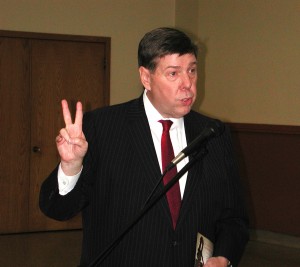
Kansas City—In one of its last acts before adjourning its state convention last month, the Missouri AFL-CIO adopted a resolution at its convention here opposing Amendment 3 on the Nov. 6 ballot. The amendment would modify the state’s popular Nonpartisan Court Plan and pave the way for more partisan politics in the selection of judges.
In doing so, it could threaten the independence of the judiciary by opening a new arena for well-financed interest groups to influence judicial decisions.
Organized labor opposes any change in the selection of judges, especially anything that could inject more money into the process.
“There is simply no way we can compete with the money that would be available to influence the selection of judges, “ says Herb Johnson, secretary-treasurer of the Missouri AFL-CIO.
Delegates to the St. Louis Labor Council heard a presentation on the issue recently by Mark Moreland, representing the Missouri Association of Trial Attorneys. He or another representative of the association or the Missouri Bar are available to speak to union meetings about the issue. Morland’s office number is 314-621-6600.
Morland said the amendment is opposed by both plaintiff and defense attorneys. Amendment 3 was put on the ballot by Republicans who were responding to nonunion contractors and other special interests who have given hundreds of thousands of dollars to GOP members of the state House of Representatives and Senate.
According to State Sen. Tim Green (D-Spanish Lake), who has battled these same interests in the legislature for years, their motive is to gain a dominant interest in Missouri’s courts similar to what they have achieved in the state legislature, where they have been fervent proponents of anti-union legislation.
While partisanship has always played a role in the selection of Missouri judges, its influence is limited by the staggered terms of appointments to the commission that recommends nominees to the governor for appointment. Judges for the most part are immune from the special interest lobbying that takes place with governors and members of the legislature who are influenced by large campaign contributions.
In a statement when it passed last May, Missouri Bar President Lynn Whaley Vogel warned that the proposal could lead to big-money influence in the selection of judges.
“The Missouri Bar is committed to keeping big money partisan politics out of Missouri’s judicial branch of government. That is why we oppose Senate Joint Resolution 51 (the proposed amendment). It would grant a governor full control over the commission that selects the candidates for appellate judge submitted to the governor. “
The effect would be the elimination of the state’s merit-based judicial selection process, Vogel said.
“At the end of the day,” Vogel said “these are unnecessary changes that would weaken a system that has produced a steady stream of competent judges for 70 years.”
Despite his gaining more power under the new proposal, Gov. Nixon says he supports the present system of selecting judges and saw no reason to change it.
Currently, judges are selected by a plan adopted in the 1940s in response to scandals over the way judges were being selected by politicians in St. Louis and Kansas City.
The amendment will be on the ballot for a statewide vote in the general election Nov. 6. It will require a simple majority for passage.

